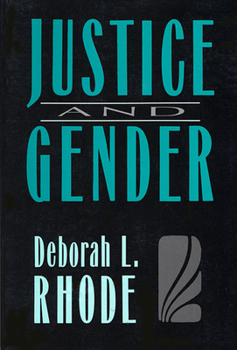Justice and Gender: Sex Discrimination and the Law
Select Format
Select Condition 
Book Overview
This is the first book to provide a comprehensive investigation of gender and the law in the United States. Deborah Rhode describes legal developments over the last two centuries against a background... This description may be from another edition of this product.
Format:Paperback
Language:English
ISBN:0674491017
ISBN13:9780674491014
Release Date:October 1991
Publisher:Harvard University Press
Length:440 Pages
Weight:1.61 lbs.
Dimensions:1.1" x 6.2" x 9.3"
Customer Reviews
1 rating
A thorough overview of feminist jurisprudence.<p>
Published by Thriftbooks.com User , 27 years ago
Deborah Rhode provides a historical overview of social gender inequalities that have manifested in the law. She assesses various feminist responses to these inequalities and argues that the establishment of a cohesive feminist philosophy of law, or feminist jurisprudence, will be the most direct, effective way to enacting legal reform addressing them. Her presentation begins with a brief explication of the historical framework prior to the contemporary women's rights movement. Rhode discusses domestic expectations of and restricted opportunities for women prior to the mid-nineteenth century and illustrates how early feminist developments, such as the writing of the Seneca Falls Declaration of Sentiments and the suffrage movement, helped loosen these social constraints. With the passage of the Nineteenth Amendment in 1920, women gained a degree of political power they never had before. Political power and greater access to the legislature became a means to redressing social gender inequalities in the law. The nascent women's movement of the time played a major role in promoting reform, and since then, has grown tremendously. Unfortunately, despite having general common goals, such as expanded employment and educational opportunities for women, reproductive freedom, nonsexist portrayals of women in the media, and revisions in criminal law and family policy regarding marital support, domestic violence, and rape, the women's movement in its present state is largely fragmented. This state of fragmentation is not conducive to promoting legal reform since each segment of the women's movement conceives reform differently. Rhode argues that fragmentation results from "false dichotomies," or reductionist, binary notions of gender and issues pertaining to gender inequalities that do not capture the intricacies of such concepts. To build an effective women's movement able to achieve lasting social change, Rhode stresses the need to deconstruct simple, dichotomous thinking and address social problems in their full complexity. She maintains that feminists must establish one feminist jurisprudence based upon the manifest gender disadvantages that result from the current practice of law. A united feminist jurisprudence is essential if social change is the be enacted; fragmentation of the women's movement is a major setback. With one cohesive jurisprudence based on observable, undeniable gender inequalities, not multiple philosophies of law with diverse speculations regarding essential similarities and differences between and within gender groups, the women's movement would be in a stronger position to advocate legal reform. Justice and Gender represents a broad historical synopsis of women's relation to the law. As a reference book for a general overview of current women's issues, trends in the legal treatment of women, theories regarding trea






